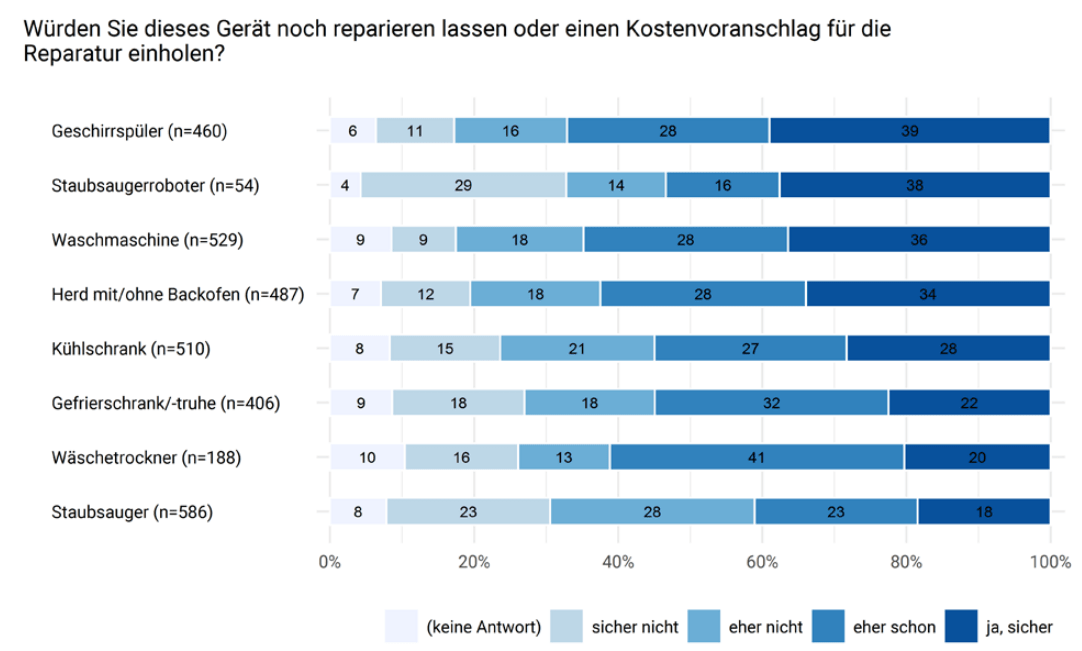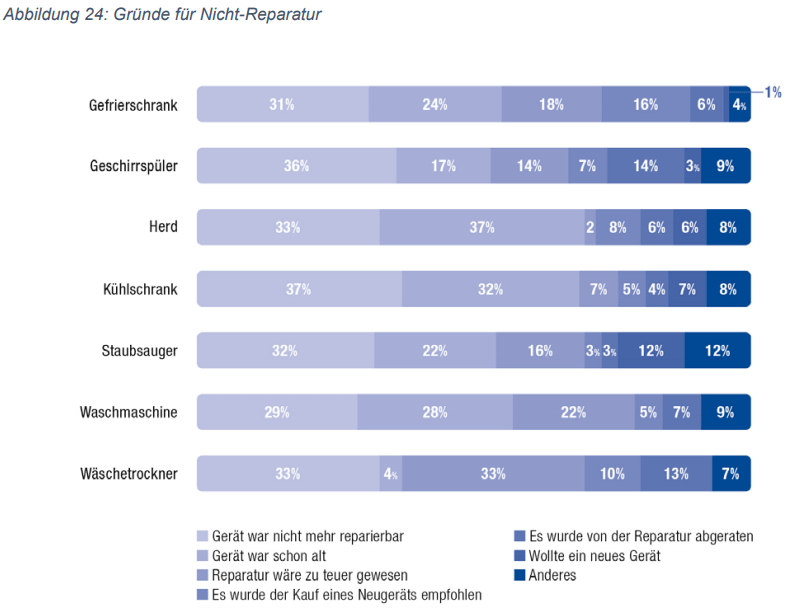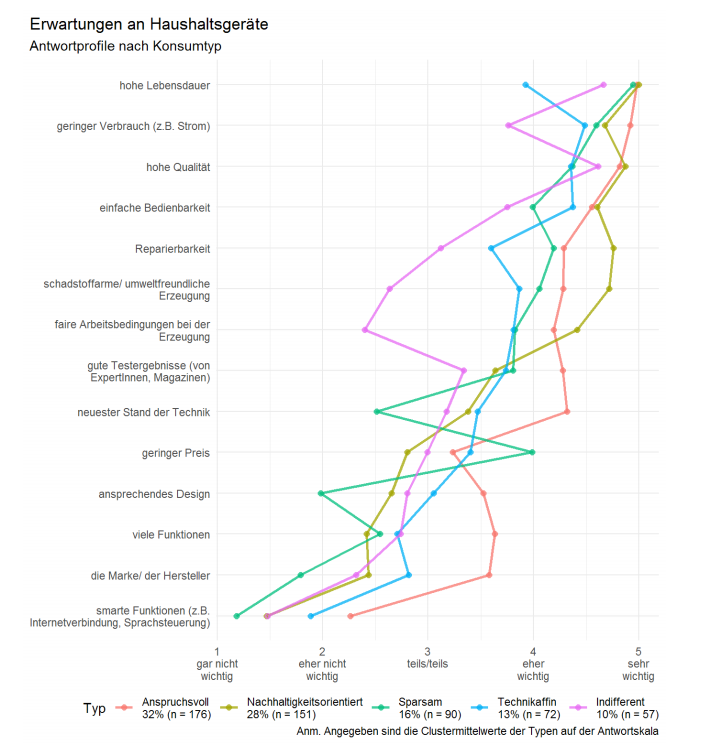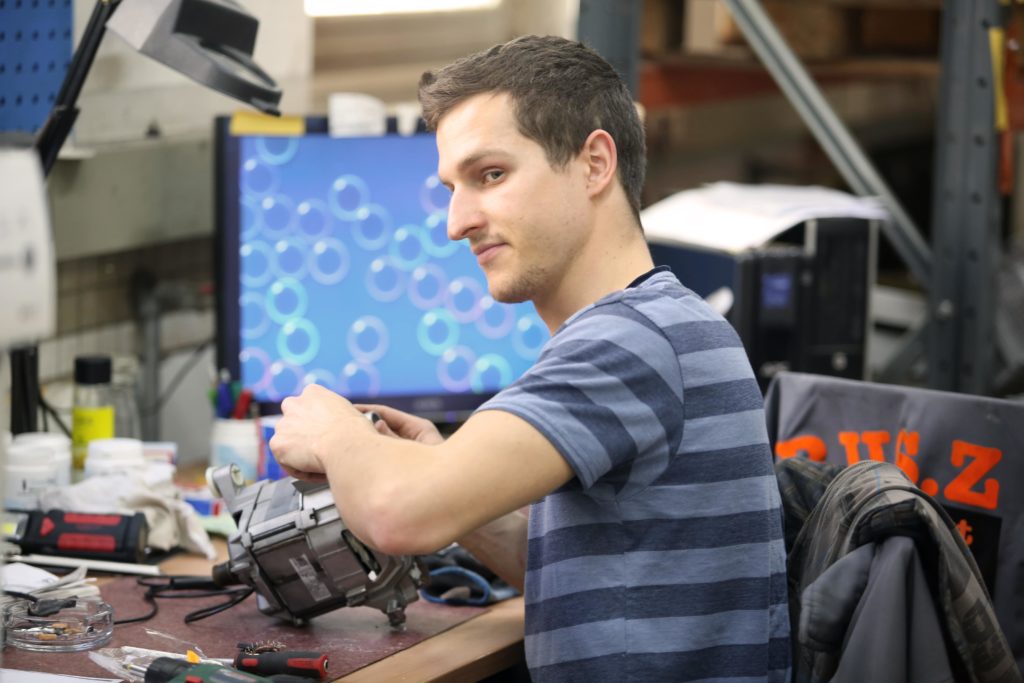Consumers want durable and repair-friendly household appliances and corresponding measures from politicians!
In May 2021, the Vienna Chamber of Labour conducted a study in its series "Materials on Consumer Research" on the topic of large household appliances with regard to durability and reparability. In the process, not only the repair behaviour but also the support for consumption policy measures was surveyed. In this article we summarise the results and the consumer policy demands of the Chamber of Labour.
The study reveals a pleasing general trend: Austrian consumers want to use their appliances for as long as possible, show a very high willingness to repair and essentially only want to replace their appliances when they are defective. This is also reflected in actual behaviour: appliances are replaced when they break down and can no longer be repaired.
The willingness to repair is highest for washing machines and dishwashers - almost two-thirds of respondents would definitely or rather have these repaired. Almost 60 % would have a defect in a cooker or tumble dryer repaired, but in the case of the latter only one in five respondents is sure and 40 % would "tend to" do so.

The majority of repairs are carried out by professional repair services, e.g. 84% of refrigerators and 58% of washing machines. But self-repair and repair with the help of social networks are also playing an increasingly important role: 34% of hoovers in particular are repaired by themselves and 34% by social networks.
The three most important reasons for not repairing all appliances were the lack of reparability, the old age of the appliances and the high cost of repair.

In order to illustrate consumers' expectations of their household appliances, the study differentiates five consumption types on the basis of the data collected: A more technology-oriented type contrasts with a sustainability-oriented type and thus also reflects ideologically divergent social developments. In addition, three further types, a demanding type, a thrifty type and an indifferent type were identified.
The technology-oriented and indifferent types act less sustainably than the comparison types. The most interesting differences in the patterns of action concern the useful life and willingness to repair. The sustainability-oriented and the thrifty types tend to have longer useful lives, while the technology-savvy and indifferent types tend to have significantly shorter useful lives. In terms of willingness to repair, the sustainability-oriented and demanding types welcome repair more often than average, while the technology-oriented and indifferent types mostly reject it.

However, despite all the differentiation, there is a tendency that durability and quality are clearly most important to all types of consumers and so-called "smart" functions are least important.
85% of the survey participants fully or somewhat agree that we live in a consumer society characterised by abundance and that we actually have far too many things that we do not need (Fig. 29). According to the respondents, advertising is partly responsible for this - for 3/4 of the respondents, it seduces us into constantly buying new things. Consumers have options for action and 70% fully or somewhat agree that consumers should reduce their needs and wants. Only ¼ of consumers see that purchasing decisions influence supply.
Consumer policy measures
The fact that Austrian consumers want to use their appliances as long as possible and also have them repaired is not only reflected in the behaviour surveyed, but also in the high level of approval for a large number of consumer policy measures to promote durability and repairability. Overall, consumers should be strengthened in their position and the possibilities for repair and reuse should be expanded.
- Warranty: Warranty claims play an important role in the context of product sustainability and the enforcement of consumer rights.
- Sustainable product design: Producers should be encouraged to make their products more durable from the outset, e.g. through modular design. Through modular design, individual components can be adapted and brought up to the latest technical standards without having to replace the entire device. The standardisation of product parts (see below) should also be seen in this context.
- Standardisation of product parts
- Obligation to guarantee software updates for a certain period of time
- Better framework conditions for repairs: Repairs should be technically possible, easy to carry out (e.g. battery replacement, ban on special tools, availability of spare parts) as well as affordable and attractive (e.g. availability of replacement devices and parts). Industry must take its responsibility and facilitate repairs through appropriate product design. Retailers are called upon to organise repair services instead of advising new purchases. By promoting independent repair businesses, local jobs could be created, especially in the social economy. Independent repair service providers should be given comprehensive access to design and repair instructions for products.

- Strengthening and extending the Ecodesign Directive: The Ecodesign Directive contains important mandatory measures for individual product groups (e.g. minimum durability, availability of spare parts, etc.), but with too much focus on energy efficiency and too little on the "right to repair"! Strengthening market surveillance and legal certainty for consumers is just as necessary as faster implementation.
- Transparent and easily understandable consumer information: A prerequisite is the increase of legal minimum standards, e.g. the Supply Chain Act: Consumers have basic assurance that human rights and environmental standards are complied with.
- Increase market transparency of products: For consumers, the market offer of individual products is confusing and opaque. There are many variations of similar products from the same manufacturer. This leads to significant disadvantages for consumers, but also for the environment (e.g. with regard to spare parts). From the consumer's point of view, a more transparent offer (e.g. through uniform and comprehensible model and type designations) would be desirable.
- Advertising must be ecologically and socially compatible (e.g. responsible use of resources, i.e. longer use of products) and greenwashing methods must be stopped. Sustainability in general is experiencing a social upswing, and companies have also discovered this as an advertising strategy. For consumers, however, it is often not clear whether this is a serious product alternative to conventional products or a pure marketing tool.
- With a focus on the debates about the good life for all, it is a social question what kind of and how much consumption is desirable. In this context, it is important to negotiate discourses on consumption at the societal level and not at the individual level. There is a need for a broad debate on the framework conditions for sustainable consumption.
